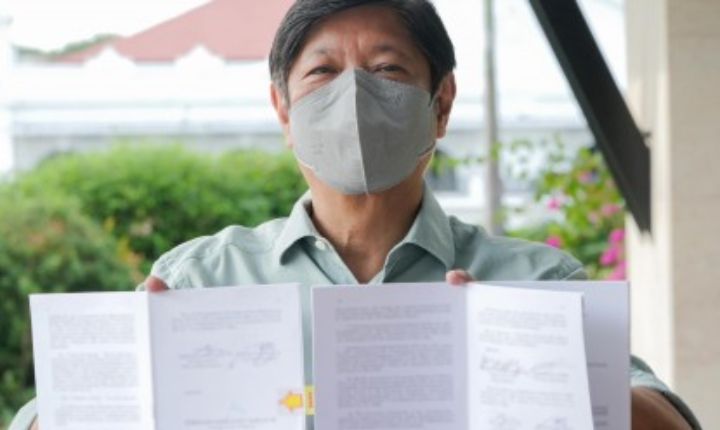On December 5, 2023, President Ferdinand R. Marcos Jr. signed the Internet Transactions Act of 2023 and the Public-Private Partnership Code of the Philippines (PPP Code). The Public-Private Partnership (PPP) Code of the Philippines and the Internet Transactions Act of 2023, according to President Marcos, “show the country’s commitment and readiness to embrace the digital economy and accelerate its development.” Let’s learn more about what it means for Philippine businesses today.

Photo Source: Philippine News Agency
What is the PPP Code of the Philippines?
The goal of Republic Act No. 11966 is to give public-private partnership initiatives a novel foundation. The Build-Operate-Transfer (BOT) Law served as the legal basis for PPP projects for many years, but reformers desired more detailed instructions on collaborations along with more precise regulations on invited and unpublished applications, among other things. The new law aims to close loopholes in the infrastructure system by providing clearer guidelines for government and private sector interactions.
Institutionalization of the PPP Code in the Philippines
It establishes the PPP Governing Board, which will serve as the PPP projects’ policy development body and the PPP Center. As long as there isn’t a national government initiative, the law also permits regional governments to engage in PPP projects.
Internet Transactions Act Among Industry Players
Republic Act No. 11967 aims to create a strong online marketplace in the Philippines for eCommerce. The Department of Trade Industry’s E-Commerce Bureau, which is established by law, will be responsible for creating policies and making sure that online retailers and digital platforms, both foreign and Filipino, remain registered with the government.
E-Commerce Industry According to the PPP Code of the Philippines
The nation’s efforts towards safeguarding online shoppers and vendors, as well as to use eCommerce as a vehicle for expansion and growth, are highlighted by the ITA, or “An Act Protecting Online Consumers and Merchants Engaged in Internet Transactions, Creating For This Purpose the Electronic Commerce Bureau, Appropriating Funds Therefor, and For Other Purposes.” The ITA affirms ethical business conduct, encourages inventiveness, and establishes efficient dispute-resolution procedures.
What is the Electronic Commerce Act of 2000?
The Department of Trade and Industry’s E-Commerce Bureau will be in charge of putting the law, the Electronic Commerce Act of 2000, and the Philippine E-Commerce Roadmap into action.
This act seeks to establish the legitimacy and dependability of digital commerce by facilitating domestic as well as international interactions, operations, structures, commitments, deals, and knowledge exchanges and the preservation through the use of technological optical and comparable media, modes, instrumentalities, and technologies.
What are Public-Private Partnerships (PPP)?
Public-private partnerships are collaborations between a commercial enterprise and an official body that can be utilized for financing, construction, and operation of projects like convention centers, green spaces, and public transit systems. A public-private collaboration can finance a project, making it possible for it to begin with or to be finished faster.
What do PPPs in the Philippines Include?
Public-private partnerships may entail giving entrepreneurs and commercial entities concessions of tax or similar operating income, liability insurance, or significant ownership rights over ostensibly public assets and infrastructure.
How does the PPP Code work?
Agreement durations for public-private partnerships are usually 20 to 30 years or more. Although some funding is provided by the business community, contributions are also required from the public sector, users, and/or both during the course of the endeavor.
While the public partner concentrates on establishing and overseeing adherence to the goals, the private stakeholder engages throughout the project’s design, completion, implementation, and funding. Throughout a negotiation process, risks are divided amongst public and private parties, ideally but not necessarily in accordance with each party’s capacity to evaluate, manage, and handle them.

Benefits and Risks of the PPP Code in the Philippines
Benefits
Governments and private businesses can benefit from the PPP Code of the Philippines in many ways. For instance, technological developments and innovation from the business community can help increase the practical efficacy of delivering public services.
For its part, the broader public sector offers subsidies to the private sector to ensure that projects are completed on schedule while staying within budget. Furthermore, by diversifying the economy, the nation can more easily support its physical infrastructure and grow related industries like development, machinery, assistance providers, and other enterprises.
Risks
Participating in a public-private partnership may entail unique risks for the private party. There are dangers associated with building physical facilities such as roads and railroads. In most cases, the private partner is responsible for any delays in delivery, overruns in costs, or malfunctions with the product.
When fewer people utilize a service or piece of infrastructure—like toll highways, railways, or tunnels—than anticipated, demand risk arises. However, if the public partner consented to pay a minimum charge regardless of demand, this risk may be transferred to them.
Examples of the Implemented PPP Code in the Philippines
Typically, collaborations between the public and private sectors are seen in transportation infrastructure, which includes tunnels and bridges, trains, transportation hubs, and freeways. Water and sewage treatment plants are two types of municipal and environmental infrastructure that are part of the PPP Code of the Philippines. Buildings used for education, corrections, housing for students, and venues for sports or recreation are examples of public service accommodations.
Revenue Risk of the PPP Code of the Philippines
The possibility that the private partner in a PPP won’t be able to recoup its initial outlay or continuing expenditures associated with maintaining an element of technology is known as revenue risk. This could be the result of toll rate caps or less traffic than anticipated on a toll road. Comprehensive research ought to be done beforehand in order to reduce this danger and prepare for emergencies.
Elements of the PPP Code of the Philippines
Buy Build Operate (BBO)
This occurs when a government sells an already-completed infrastructure to a private entity that will fully assume control of it after it has been run by the state for a while. The private party might have to make financial contributions to develop or repair the construction endeavor further.
Build Operate Own (BOO)
The private company is exempt from ever having to turn over control of the project to the governmental entity.
Build Operate Transfer (BOT)
For a certain period of time, a government turns over all buildings and operations to a private company (typically several decades or more). It is turned over to the governing body after this period.
Design-Build (DB)
A private company is hired by the government to design and build a project in exchange for a fee. The government owns the property and has the option to run it internally or hire out the management.

Public-private partnerships are a means by which governments work with private sector organizations to finance initiatives. Governments often employ these kinds of partnerships to fund governmental initiatives alongside facilities related to transport, municipalities, and sustainability despite their advantages and disadvantages. As for the newly signed PPP Code of the Philippines, businesses are yet to see its concrete advantages and disadvantages for the coming years.









